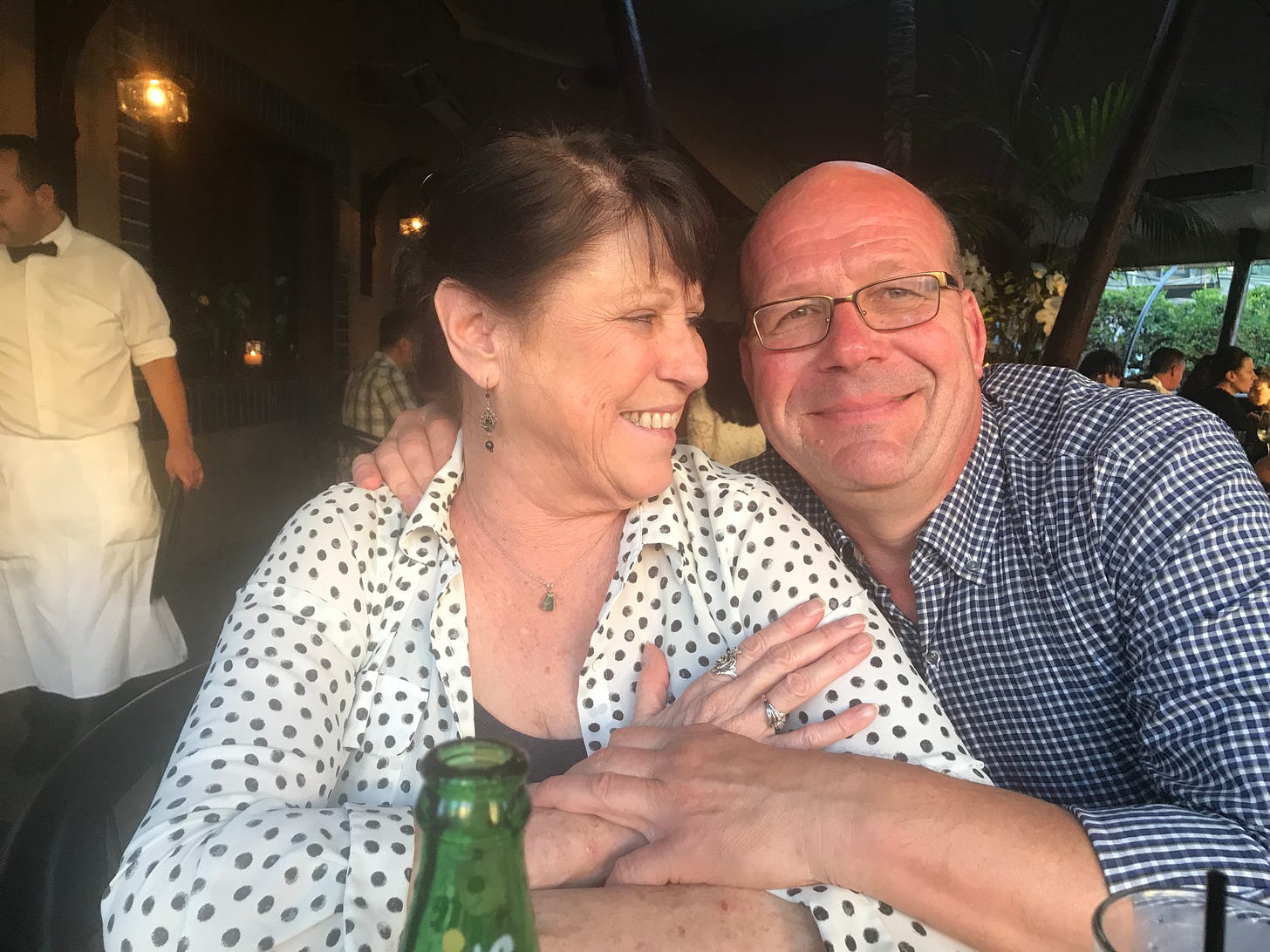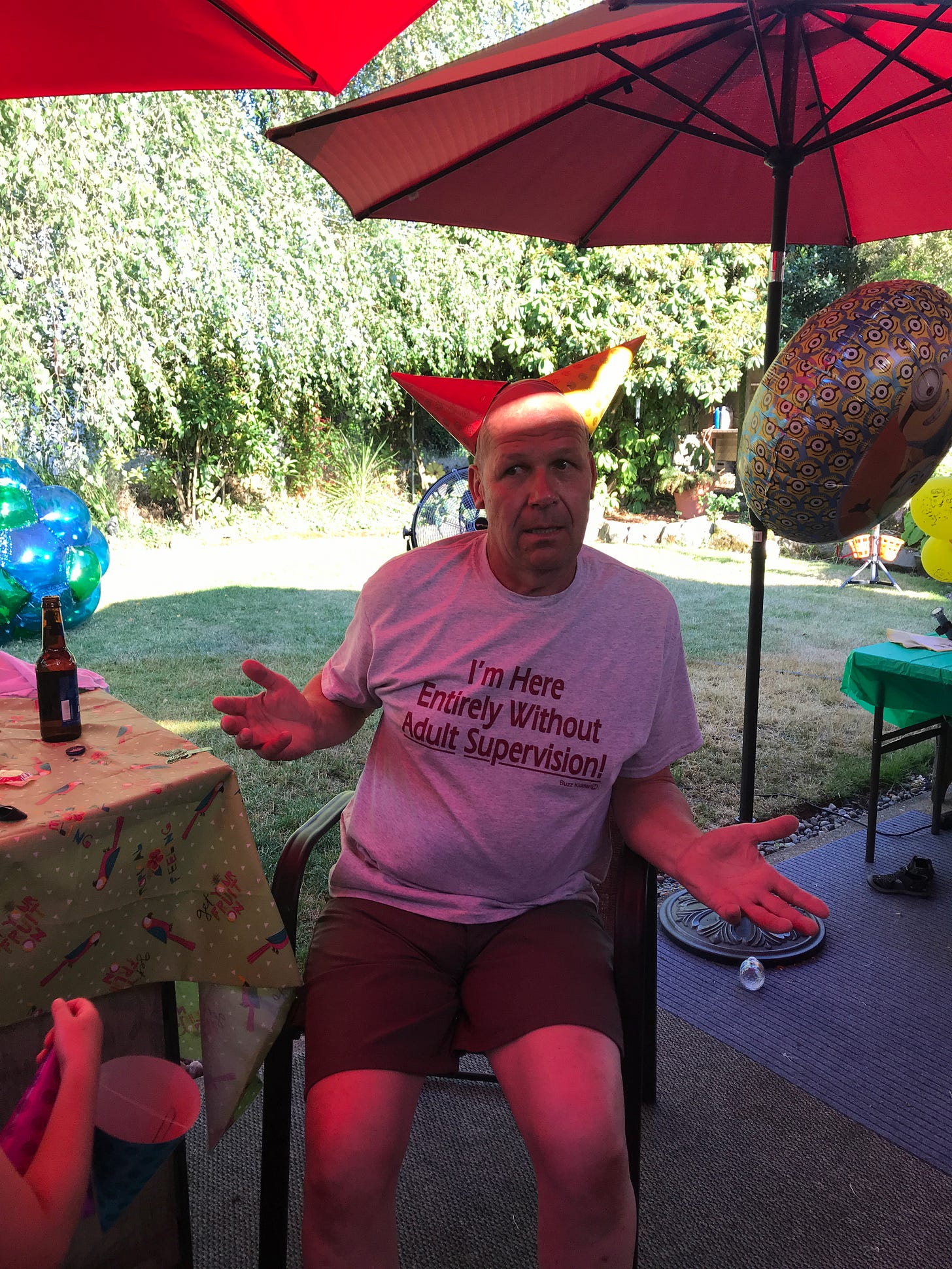This week, my father-in-law, known to my kids as Grandpa Johnny, passed away. His death was unexpected, and tragic, and not without complexity. We still don’t completely understand what happened.
He was 61.
He married my mother-in-law, ten years his senior, in 2012—the same year my oldest child was born. It was a third marriage for both, and they’d already been together for four years by the time they wed.
He was a working class guy his whole life. He had a teamsters pension, and spent the last chunk of his working life as a warehouse manager for a welding supply company outside of Seattle. Before that, he drove a bakery delivery truck for years.
There are many things I could say about him, and stories I could tell. He had a hard childhood filled with abuse, and a hard life, and his keenly developed sense of humor carried him through it all. His laugh was infectious. He was not without flaws and struggles, some of which were hard to bear when they emerged.
But I choose to remember him this way: in a parking lot in Auburn, Washington in 2015, waiting for my mother-in-law to come out of Walmart, with me and two toddlers in the back seat, when he turned to me out of nowhere and said “Elizabeth, the thing about your mother-in-law is that she made me a better man. She taught me how to love. She changed my life, I can’t even tell you. She saved me just by loving me.”
He was, as we said, “a crier”– at movies, at weddings, at everything that pulled at the heartstrings.
That moment was no exception.
We’ve stopped publicly counting the dead in this country now, as if the pandemic is over. As I’m writing this, the number of dead tops 1.05 million in America alone. My father-in-law had Covid during the Delta wave after being vaccinated, and we’re not sure yet whether that contributed to his death in some way.
What I am thinking about today, 48 hours on from this loss, is the ripple effect of a life.
Family and friends and co-workers. Parents and children and grandchildren. Communities and unions. Neighbors and loved ones. These extended connections that span states, and nations.
None of us are alone, and the loss of one person impacts thousands.
Multiply that by more than a million, and the gaping loss in this nation is unbearable.
And yet, we carry on, pretending that there’s not a hole in so many of us, pretending we aren’t marked by the absence of someone we loved.
Why we aren’t engaged in national mourning is beyond me.
In the quiet spaces these last few days, I hear his voice, calling my kids by their nicknames over Facetime, or telling my son how to put on safety glasses to help him use the electric leaf blower, or explaining to him how to wash the car.
I hear him laughing over the pans of bacon he would make for the kids on holidays, or filling balloons from a helium tank in their garage to make the kids laugh, even when they were so little the balloons were just tied to a packable crib. I scan the photos of him, goofing off in the backyard in Boulevard Park, trying to make the kids collapse in fits of giggles.
I wonder about all the stress of a life, let alone these last few years taking care of my disabled mother-in-law, about the toll it took, and about the way we leave people to flounder in this country when someone in our family becomes sick, whether as victims or as caretakers.
I think about how we abandon people to trauma.
In the dark of the early morning in my own house when they were visiting, I’d awake to find that John had made the coffee.
He’d line the coffee cups up precisely on a folded kitchen towel, with milk and sugar out, the coffee perfectly brewed and waiting for me, the earliest riser.
He’d creep out of bed at god knows what hour to do this for me, the single mother of two of his grandchildren.
He’d go back to bed after, but he’d insist on doing this, just to show me daily and wordlessly, for the entire time he was here, that he knew what it took for me to do it all everywhere else.
There are a lot of things left unsaid now.
My last words to him were quiet but insistent: “take care of yourself.”
I knew he was struggling. I knew that it was hard, because I’d seen it.
We sit here now, remembering him— this generation: his daughter, me, his two step-sons, and then his five grandchildren, and then his wife, who never expected to outlive him.
There is beauty and mess in every life. Damage done and gifts delivered and memories that are gut-wrenching and moving and full of joy and so hard.
His life is no exception.
For the gift of humanity, we trade in love and pain.
For John, with love: may you rest now. You are missed.







Thank you for sharing your grief. All of us are grieving in some way. Your words speak to my soul. And bring tears to my eyes. Your writing is such a gift.
I am very sorry for your loss, dear Elizabeth, and the loss to your family. Your beautiful tribute strikes home, not only as a revelation of your father-in-law’s character but also as a lesson to us all to take nothing for granted in our loving relationships. May his memory be a blessing.